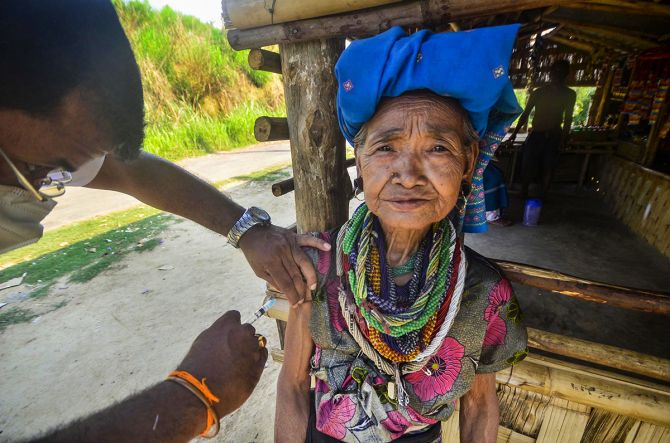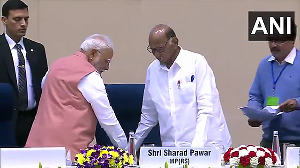The vaccination rate needs to go up by three to four times, assert Ajay Shah and Amrita Agarwal.
 /p>
/p>
The pandemic is having a horrendous impact on lives, society, and the economy. Vaccination is the only path to normalisation.
Currently, the global and domestic vaccine supply is tight, but this will ramp up by 2022.
The recent liberalisation of the Indian vaccine policy will take a few months to yield impact.
Indian buyers should pay a premium and lock in long-term contracts with suppliers.
Governments should not coerce private companies. Governments should prioritise vaccination services and voucher programmes for at-risk persons and for the poor.
The key problem to focus upon is the development of organisational capabilities in government organisations and in private firms.
In the official data, India is at 4,000 deaths and 400,000 cases every day.
The weak healthcare system is overwhelmed, leading to avoidable deaths.
Everyone's mind space is occupied with sickness and lockdowns; this hampers the ability to create, invest, and get back to progress.
It feels like a calamity with no end in sight.
In the short term, the battle of controlling the outbreak calls for social distancing, masks, and oxygen.
But winning the war -- restoring normalcy -- can only be done through vaccines.
So far, 150 million vaccine doses have been administered. About 9.2 per cent of the population has received one dose, and 1.9 per cent has received two doses.
The vaccination rate, which is at about 3 million doses per day (roughly 90 million doses per month), needs to go up by three to four times.
How can this scale-up be achieved?
Right now, there is a supply bottleneck. Domestic production of about 70 million-80 million doses per month is not sufficient. Global production is tight today, but it will ramp up in the coming months.
The government order on April 23 removed many restrictions, giving: a. Freedom to private persons and state governments to buy vaccines and b. Freedom to import.
These changes will unlock the energy from varied Indian buyers -- states, firms, communities, and individuals -- and increase their accessibility to global supply.
Indian buyers need to explore the global vaccine market and be comfortable paying market prices.
As an example, the Israeli government paid $28 per dose (Rs 2,000 per dose) to Pfizer and Moderna in late 2020, which was 43 per cent higher than the price paid by the US and the EU. This got them rapid vaccine deliveries. They have vaccinated most of their population and now do not force people to wear masks.
If Indian persons (private and public) put down Rs 2 trillion -- a billion doses at Rs 2,000 per dose -- this would yield transformative impact. This is a price worth paying to control the economic and human cost.
The Johnson & Johnson and Sputnik vaccines are being sold globally at $10 per dose. Indian buyers should be willing to pay $15 per dose to get fast delivery of high quantities.
Paying higher prices would also increase domestic and global suppliers' ability and willingness to scale up production at the earliest.
In this, Indian buyers should view the problem of adult vaccination from a more strategic perspective, rather than just a one-off problem of getting one billion doses.
As the virus mutates, there will be a need for booster shots targeted at emerging variants. This is particularly well done using messenger RNA (mRNA) vaccines.
Covid management may shape up as one booster/year per person. Indian buyers should plan for this scenario.
In countries such as Israel and the EU, long-term contracts have been established with Pfizer and Moderna towards this purpose.
Indian buyers need to demand that global vaccine makers track the variants prevalent in India for these long-term booster vaccine contracts.
In a vaccine monoculture, there is greater vulnerability to a strain that manages to break through. When buying is done by many private persons and sub-national governments, monoculture is avoided.
Union government purchases need to be spread across (say) five different vaccines in order to address this possibility.
The engagement of the Indian State with vaccine makers, in India or abroad, must be restricted to the language of prices, quantities, and contracts.
The use of State power, to try to forcibly obtain certain behaviour by private persons, will lead to higher prices and reduced quantities.
Many people would like to have cheaper vaccines. But trying to use the coercive power of the State, or enforcing price controls, will end up shrivelling the quantities.
Price restrictions would deter domestic manufacturers, traders, and providers from building organisational capabilities for vaccine supply, cold chain, and last-mile delivery to citizens.
Higher prices would create the pathways through which private persons will solve the problems of raw materials, cold chain, process modifications to reach various segments of the population, etc.
Even if price restrictions today are absent, the possibility of price restrictions in the future is harmful. This will deter commitments of time, money, and effort, by private persons, to build organisations that serve the Indian population.
When there is high uncertainty about how State power will be used in the future, the private sector will fall back into a defensive posture, do a few obvious trades that make profits in the short run, and not commit to the difficult task of long-term organisation building.
There is a public health objective and equity objective of influencing the vaccine purchase decision of super-spreaders, at-risk populations, and the poor. These should be addressed through vaccine vouchers.
Vaccination vouchers should be given under the Pradhan Mantri Jan Arogya Yojana, state insurance schemes and the Employee State Insurance Scheme.
New institutional capabilities will need to be built, in government organisations (Union, state, and city) and in private firms, for this world. These will not come about immediately.
In government organisations, systematic work is required for building policy thinking and state capacity.
In private organisations, if there is confidence about state coercion at future dates, there will be commitments to build organisations and achieve the required capabilities.
Ajay Shah is an independent scholar and Amrita Agarwal is a researcher on health systems.












 © 2025
© 2025